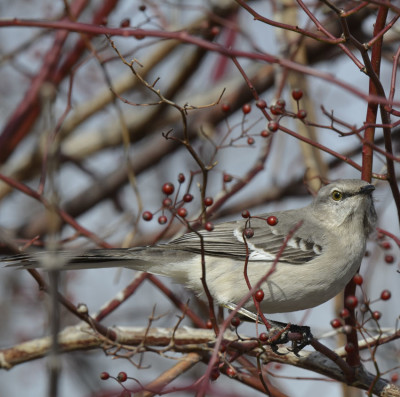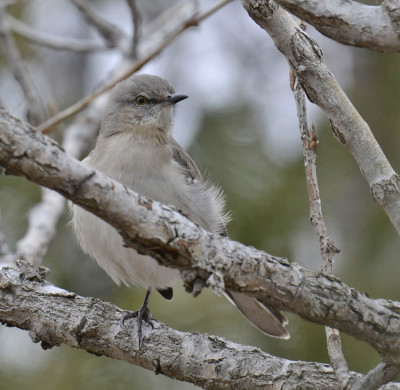(This post is from 2016: Northern Mockingbirds have become steadily more abundant in southern Ontario.)
While I enjoy watching winter ducks and the small birds that only flock south to visit us when there’s snow on the ground, I’m always interested in birds that aren’t common in my immediate area. So this February, I went in search of Northern Mockingbirds and found not one but two despite the snow here in southern Ontario.
The Silence of the Mockingbirds
According to the Cornell University website Northern Mockingbirds “sing almost endlessly.” I guess that’s birds that aren’t freezing their tail feathers off as neither of the two I spent time with recently emitted even the faintest “cheep.”
What Do Mockingbirds Eat Especially In Winter?
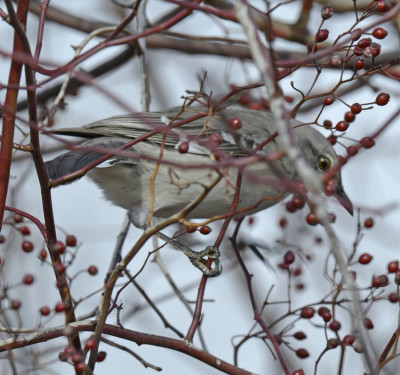
Mockingbirds are noted for their long tails but if you see one in a pose like this you might not agree.
Like many birds, Mockingbirds eat insects in summer and fruit in winter. So when I was looking for them this winter, I paid more attention in places with rose bushes and small decorative crabapples than in open wind-swept fields of dry grasses and in the spruce and maple forests.
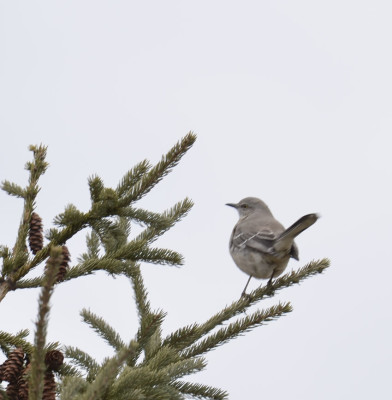
OK, this one was perched on a spruce but only briefly.
Both of the birds I found were near Multiflora Rose bushes still covered in small red fruit. My two Mockingbirds were not unique for eating the hips off the rose bushes: the AllAboutBirds website says they eat many fruits in the colder months “as well as fruits from multiflora rose.”
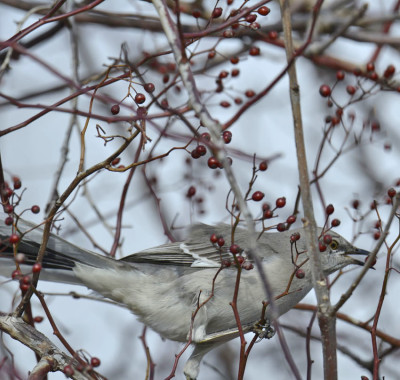
It’s hard to see but this Mockingbird is actually plucking a rose hip off the bush.
In the summer, I would expect to see them just about anywhere as they eat worms, caterpillars, bees, moths, beetles and just about anything else small that moves!
Are Mockingbirds Common in Ontario?
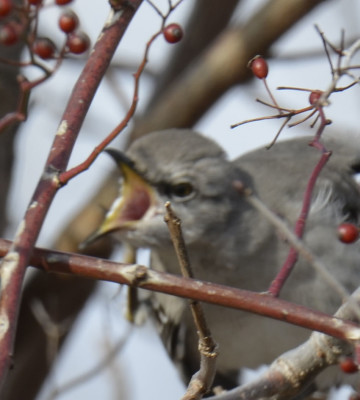
The shape of the bill is a bit unusual as you can see in this out-of-focus shot.
Like many southern birds that are expanding north, Northern Mockingbirds are “locally” common. Like the Northern Cardinals who moved into southern Ontario a few decades ahead of them, the Mockingbirds first move into an area as an unexpected surprise but if they experience breeding success become a regular year-round resident of their new neighbourhood.
In general, Mockingbirds don’t migrate south for the winter. So like Cardinals, Tufted Titmice, Carolina Wrens and other southern birds that now make Ontario their home, Northern Mockingbirds are limited in how far north they can establish themselves.
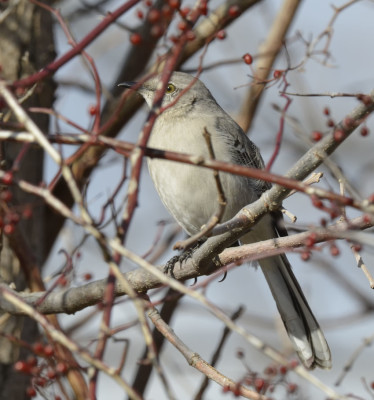
The eye is quite noticeably bright and looks red, yellow, orange or even greenish depending on the lighting.
In a mild winter, like this one (so far) in 2015-2016, mortality will usually be low. In a winter with weeks of -20C weather punctuated with fruit-hiding ice storms, the mortality rate will be much higher. Unlike Black-capped Chickadees, Dark-eyed Juncos and Gray Jays which have developed strategies to deal with cold weather, Mockingbirds don’t have techniques to cope. If there are enough “warm” winters in a row, their range grows and more people get to enjoy these new neighbours.
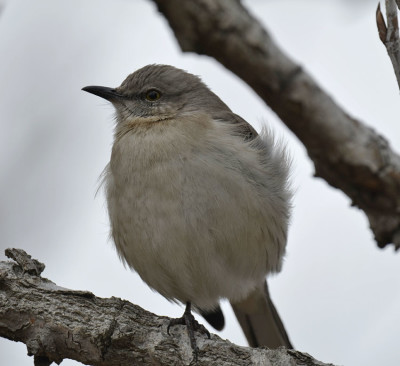
From the front, Mockingbirds are very plainly coloured.
While I’ve seen Mockingbirds several times in the Toronto to Hamilton area, I still enjoy each sighting. I’m sure some Birders in the US would find it quite amusing that I had to “stalk” these birds to get photos: to them, it would be like having to “stalk” a backyard Robin. That’s one of the amusing quirks of bird watching.
Related Reading
- What Black and White Bird has a Tan Helmet and Likes Grassy Fields?
- What Small Chunky Brown Birds Hold Their Tips Up Straight?
- What’s Mewing Like a Cat?
Join In
Have Northern Mockingbirds made it to your neighbourhood yet? Does the steady singing of the males disturb your sleep? Please share your experiences with a comment.

